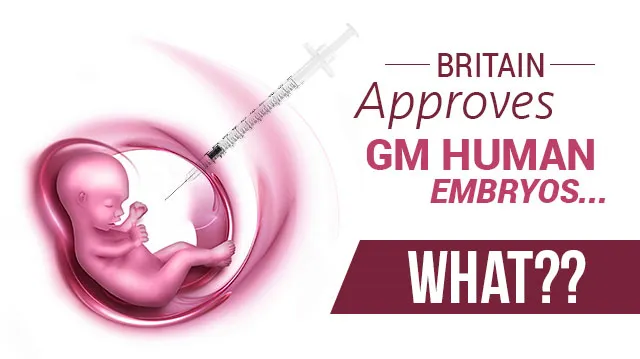We’ve all heard of genetically modified corn, genetically modified soy… but genetically modified humans? We are one step closer to this becoming a reality as the genetic modification of human embryos has just been approved in Britain.
The United Kingdom’s Human Fertilisation and Embryology Authority has just given Dr. Kathy Niakan and her research team at London’s Francis Crick Institute permission to perform genetic modifications on week-old human embryos. This is the first time in the world such a procedure has been approved by a regulatory system.
According to reports, the research will be performed on embryos remaining from in vitro fertilization (IVF) treatments. These embryos are normally destroyed after the procedure. The system to be used is called CRISPR-Cas9 genome editing, which has only been around for three years. This technology allows scientists to hone in on specific segments of DNA and remove them from live cells.
There are some guidelines in place as to how the embryos can be used. First, the women whose embryos are used will need to provide consent. Second, it will be illegal at this juncture for the genetically modified embryos to be implanted into a female.
Before Dr. Niakan and her team can begin their research, they must receive approval from an ethics panel. They could potentially receive this approval in March of 2016.
According to the researchers, studying the DNA of these embryos could potentially help to determine the underlying causes of miscarriages. They also state that this research could help “dramatically” improve IVF success rates.
There has been quite a bit of controversy over the approval of this technology, while some experts are highly optimistic. According to Professor Peter Braude, an obstetrics and gynecology expert from King’s College London:
“Gene editing tools will allow fresh insights into the basic genetic mechanisms that control cell allocation in the early embryo. These mechanisms are crucial in ensuring healthy normal development and implantation, and when they go wrong might result in failure to implant or miscarriage. I await results with interest.”
However, other experts fear that the new technology could have dangerous consequences, as the altered DNA may harm a woman’s body if implanted. Implantation would possibly be performed, if approved, during future stages of the research. There is talk of faulty genetic alterations being passed on to new generations of humans, as well as worry over the creation of so-called “designer babies.”
According to Dr. David King, director of Human Genetics Alert:

For people struggling with miscarriages, and for those who are trying to conceive using IVF, this technology may offer a ray of hope. However, the potentially frightening ramifications of altering human DNA cannot be ignored, and are not to be taken lightly. While it is currently illegal for these modified embryos to be implanted in humans, that could change in the future as the research is developed.
Is this a path that we really want to travel down? It definitely seems that there are a lot of unknowns, and that is worrying.
What do you think? Do the possible benefits of this research outweigh the cons?
—Tanya Rakhmilevich
Tanya is a writer at The Alternative Daily with a passion for meditation, music, poetry, martial arts, and overall creative and active living. She has a special interest in exploring traditional Eastern remedies and superfoods from around the globe. Currently, she and her son live in Wisconsin, where they enjoy spending time immersed in nature.
Sources:
http://fortune.com/2016/02/01/genetically-modified-human-embryos/?xid=smartnews
http://www.independent.co.uk/news/science/uk-scientists-genetically-modify-human-embryos-crispr-cas9-dna-green-light-a6846446.html
http://www.bbc.com/news/health-35459054
